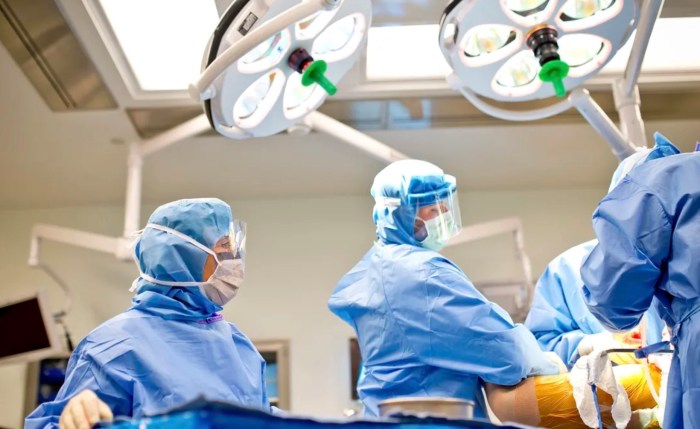Lorena wants to become a surgeon – Lorena harbors an unwavering desire to become a skilled surgeon, embarking on a path that demands both academic excellence and unwavering determination. This aspiration entails navigating a rigorous educational journey, honing essential surgical skills, and embracing the challenges and rewards inherent in this noble profession.
Educational Background and Qualifications

Pursuing a career as a surgeon entails a rigorous educational journey that demands both academic excellence and practical experience.
To embark on this path, aspiring surgeons must first obtain a bachelor’s degree, typically in a science-related field such as biology, chemistry, or pre-medicine. This undergraduate program provides a solid foundation in the sciences, mathematics, and humanities, preparing students for the challenges of medical school.
Medical School
Upon completion of their undergraduate studies, prospective surgeons proceed to medical school, a four-year program that delves deeply into the intricacies of human anatomy, physiology, pathology, and pharmacology. During this phase, students engage in classroom learning, laboratory work, and clinical rotations, gaining hands-on experience in various medical specialties.
Residency, Lorena wants to become a surgeon
Following medical school, surgeons-in-training enter a residency program, which typically lasts for five to seven years. During this intensive training period, residents work under the supervision of experienced surgeons, performing surgeries, managing patients, and honing their surgical skills.
Board Certification
To practice surgery independently, surgeons must obtain board certification from a recognized organization such as the American Board of Surgery. This certification requires passing a rigorous examination that assesses their knowledge and surgical abilities.
Continuing Education
The field of medicine is constantly evolving, and surgeons must commit to ongoing education to stay abreast of the latest advancements and techniques. This may involve attending conferences, participating in research, or pursuing additional training programs.
Skills and Abilities
Surgeons require a diverse array of skills and abilities to perform complex surgical procedures effectively. These skills encompass both technical proficiency and interpersonal qualities.
Technical Skills
- Manual dexterity:Surgeons must possess exceptional hand-eye coordination and fine motor skills to manipulate delicate surgical instruments with precision.
- Surgical knowledge:In-depth understanding of surgical anatomy, physiology, and pathology is essential for accurate diagnosis and treatment planning.
- Surgical technique:Surgeons must master a range of surgical techniques to perform procedures safely and effectively, minimizing complications.
- Instrument handling:Proficiency in handling and using surgical instruments, such as scalpels, forceps, and sutures, is crucial for successful surgery.
Interpersonal Skills
- Communication:Surgeons must effectively communicate with patients, families, and colleagues to obtain informed consent, provide clear instructions, and collaborate in team settings.
- Empathy:Understanding and compassion for patients’ physical and emotional needs are essential for providing holistic care.
- Leadership:Surgeons often lead surgical teams and must possess the ability to delegate tasks, motivate colleagues, and make critical decisions.
- Problem-solving:Surgeons encounter unexpected situations during surgery and must be able to adapt quickly, make sound judgments, and resolve issues effectively.
These skills and abilities contribute to effective surgical outcomes by enabling surgeons to perform procedures with precision, communicate effectively with patients and colleagues, and manage surgical teams efficiently.
Surgical Specialties

The field of surgery encompasses a wide range of subspecialties, each focusing on a specific anatomical region or surgical technique. These specialties provide surgeons with in-depth knowledge and expertise in their respective areas, enabling them to deliver specialized care to patients with complex surgical conditions.
When choosing a surgical specialty, several factors should be considered, including personal interests, surgical skills and abilities, and career goals. It is important for aspiring surgeons to explore different specialties through rotations and research to identify the area that best aligns with their aspirations and strengths.
General Surgery
- Involves a broad range of surgical procedures on the abdomen, gastrointestinal tract, and other organs within the body cavity.
- General surgeons are trained to perform emergency surgeries, trauma management, and a wide variety of elective procedures.
Cardiothoracic Surgery
- Focuses on surgical interventions of the heart, lungs, and major blood vessels.
- Cardiothoracic surgeons perform complex procedures such as heart bypass surgery, valve replacements, and lung transplants.
Neurosurgery
- Involves the surgical treatment of disorders affecting the brain, spinal cord, and peripheral nerves.
- Neurosurgeons perform delicate procedures to remove tumors, repair spinal injuries, and treat conditions like epilepsy and Parkinson’s disease.
Plastic Surgery
- Encompasses surgical procedures that restore or improve the appearance and function of body tissues.
- Plastic surgeons perform reconstructive surgeries for burns, trauma, and birth defects, as well as cosmetic procedures such as breast augmentation and liposuction.
Ophthalmic Surgery
- Focuses on surgical interventions of the eye and its surrounding structures.
- Ophthalmic surgeons perform procedures to correct vision problems, remove cataracts, and treat diseases of the eye.
Urology
- Involves the surgical treatment of disorders affecting the urinary tract, male reproductive system, and adrenal glands.
- Urologists perform procedures such as prostate surgery, kidney stone removal, and bladder reconstruction.
Residency and Fellowship Training

Residency and fellowship training programs are essential steps in the education and development of surgeons. These programs provide hands-on experience, mentorship, and specialized training in various surgical specialties.
Duration and Structure
Residency programs typically last for 5-7 years, depending on the specialty. During residency, surgeons rotate through different surgical services, gaining experience in a wide range of procedures. Fellowship programs are typically 1-2 years in duration and provide advanced training in a specific surgical subspecialty.
Objectives of Residency and Fellowship Training
The objectives of residency and fellowship training include:
- Providing hands-on experience in a variety of surgical procedures
- Developing surgical skills and judgment
- Gaining knowledge of the latest surgical techniques and technologies
- Preparing surgeons for independent practice
Importance of Hands-on Experience and Mentorship
Hands-on experience is crucial for surgeons to develop their technical skills and surgical judgment. Residency and fellowship programs provide ample opportunities for surgeons to perform procedures under the supervision of experienced surgeons.
Mentorship is also an important aspect of surgical training. Experienced surgeons can provide guidance, support, and advice to residents and fellows, helping them to develop their skills and navigate the challenges of surgical practice.
Career Path and Advancement

The career path for surgeons typically involves completing medical school, residency training, and fellowship training. After completing these requirements, surgeons can enter private practice, join a hospital or academic medical center, or pursue research opportunities.
Within the field of surgery, there are opportunities for advancement through leadership roles and research. Surgeons can become department chairs, division chiefs, or hospital administrators. They can also pursue research grants and publish their findings in peer-reviewed journals.
Leadership Roles
Surgeons who are interested in leadership roles can pursue opportunities to become department chairs, division chiefs, or hospital administrators. These roles involve managing a team of surgeons, overseeing surgical operations, and developing policies and procedures.
Research Opportunities
Surgeons who are interested in research can pursue opportunities to obtain research grants and publish their findings in peer-reviewed journals. Research in surgery can focus on a variety of topics, such as new surgical techniques, the development of new medical devices, and the improvement of patient outcomes.
Challenges and Rewards: Lorena Wants To Become A Surgeon

Surgeons face a multitude of challenges in their profession, including the intense demands of the job, the emotional toll it can take, and the constant need for professional development.The physical and emotional demands of surgery can be overwhelming. Surgeons often work long hours, including nights and weekends, and must be able to maintain their focus and precision for extended periods.
They may also be exposed to graphic and traumatic injuries, which can take an emotional toll.Despite these challenges, being a surgeon can also be incredibly rewarding. Surgeons have the opportunity to make a real difference in the lives of their patients, and the personal fulfillment that comes with helping others can be immense.
They also enjoy a high level of respect and admiration from their colleagues and the community.
Emotional and Physical Demands
Surgeons must be able to handle the emotional and physical demands of the job. They may encounter patients who are critically ill or injured, and they must be able to make quick decisions under pressure. They must also be able to work long hours, often in uncomfortable or stressful conditions.
Rewards and Personal Fulfillment
Being a surgeon can be a very rewarding career. Surgeons have the opportunity to make a real difference in the lives of their patients. They also enjoy a high level of respect and admiration from their colleagues and the community.
Query Resolution
What educational qualifications are required to become a surgeon?
Typically, a surgeon must complete an undergraduate degree, followed by a medical degree, and then a residency program in surgery.
What are the key skills and abilities that surgeons need?
Surgeons require both technical skills, such as dexterity and precision, and interpersonal skills, such as communication and empathy.
What are the different surgical specialties that Lorena can consider?
There are many surgical specialties, including general surgery, neurosurgery, cardiac surgery, and plastic surgery, each with its own focus and requirements.
What is the importance of residency and fellowship training for surgeons?
Residency and fellowship training provide surgeons with hands-on experience and mentorship, which are crucial for developing their surgical skills and knowledge.